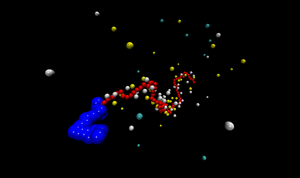DNA Electrophoresis
Electrophoresis is one of the main techniques to separate DNA molecules by size and has shown its effectiveness in the sequencing of entire genomes, including our own. This success story also increased the demand for improved and faster sequencing methods, in order to meet the upcoming challenges.
Over the last years, many experimental investigations have been performed in the field of electrophoresis, in order to improve existing methods or to develop new separation techniques which yield a faster or better separation. These experimental improvements gave rise to many interesting questions that still need to be dealt with from a theoretical point of view.
The aim of this research is to provide these fundamental understandings of the electrophoretic separation process by means of computer simulations using ESPResSo.
Special topics that are currently under investigation are:
- free-solution electrophoresis
- end-labeled free-solution electrophoresis
- electrophoresis in confined geometries
Hydrodynamic interactions are implemented in simulations by using a frictional coupling of the MD particles to a Lattice Boltzmann fluid. This efficient way of treating hydrodynamics enables a detailed study of the complex electrohydrodynamic interactions.
Coworkers
- Christian Holm: Project supervisor
- Kai Grass: PhD thesis on Hydrodynamic effects in polyelectrolyte electrophoresis
Collaborators
- M. Hervé Cottet, CNRS laboratory, Université Montpellier 2, Montpellier, France
- Ulrich Scheler, Leibnitz-Institute for Polymer Research (IPF), Dresden, Germany
- Gary W. Slater, University of Ottawa, Ottawa, Canada
Publications
Hydrodynamics with Lattice Boltzmann fluid:
-
Patrick Ahlrichs, Burkhard Dünweg.
Simulation of a single polymer chain in solution by combining lattice Boltzmann and molecular dynamics.
The Journal of Chemical Physics 111(17):8225–8239, 1999.
[PDF] (211 KB) [DOI]
Links
 Poster presented at MMSD07 (159 KB)
Poster presented at MMSD07 (159 KB)
